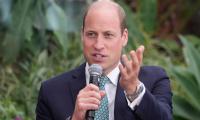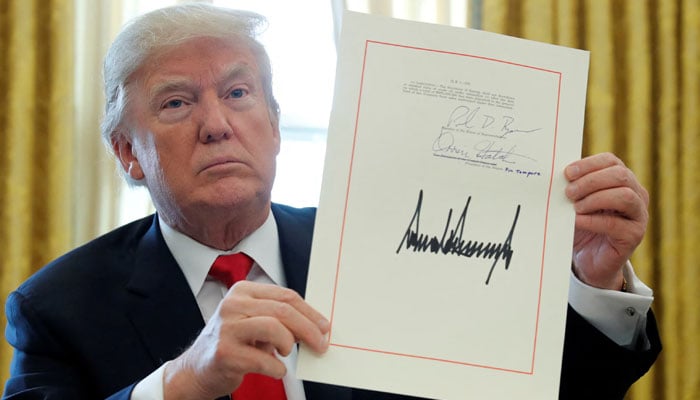Trump’s tax-cut plans could be slowed by a wary bond market
WASHINGTON: Donald Trump’s Republicans are promising to hit the gas next year when they assume full control of the US Congress, with little to stop them from executing the president-elect’s promises to slash taxes and reorder the global trade landscape.
But the $28 trillion Treasury debt market is flashing a red warning light against adding excessively to a debt load already expanding at a pace of $2 trillion a year.What is yet to be seen is whether these concerns will be enough to slow Republican lawmakers’ ambitions or push them to find offsetting savings on a tax break agenda estimated to cost nearly $8 trillion over 10 years.
Markets are betting that Trump’s tax cuts and tariffs will fuel inflation as investors demand stronger returns on longer-term Treasuries. Yields on the benchmark 10-year US Treasury note have risen to 4.3 per cent, up about 70 basis points since ‘Trump trades’ began dominating Wall Street in September.
Trump’s choice of hedge fund manager Scott Bessent as Treasury secretary prompted Treasuries to rally on Monday, erasing some of the recent increase in yields, as market analysts viewed him as a more traditional policymaker who is likely to try to control deficits.
Still, the trend is driving higher interest rates for mortgages, car loans and credit card debt, counteracting Federal Reserve rate cuts and potentially putting US growth at risk.It is also raising the cost of financing US deficits and eating up the federal budget. Interest on the public debt topped $1 trillion for the first time during the fiscal year ended Sept 30, making it the second-largest single expenditure after the Social Security retirement programme.
“In a weird way, the bond market is now on the verge of running this country,” said Republican Representative David Schweikert, who sits on the House of Representatives’ tax- and trade-focused Ways and Means Committee.
The market signals mean there are no “blank checks” for Congress and the tax cuts will need to be paired with spending cuts, he said in an interview. “It is a hurdle in the financing of the US government.”
Managing that hurdle will fall to Bessent, who has argued that Trump’s agenda will unleash stronger economic growth that will in turn drive up revenue and boost market confidence. His appointment could also reduce the chance of severe tariffs.
The budget math is daunting. Trump has promised to extend the tax cuts passed in 2017, during his first term in the White House, for individuals and small businesses that are due to expire next year, which tax experts say will add $4 trillion to the current $36 trillion in total US debt over 10 years. That’s on top of debt already forecast by the Congressional Budget Office to grow by $22 trillion over the same period, based on current laws. Trump also promised voters generous new tax breaks, including ending taxes on Social Security, overtime and tip income and restoring deductions for car loan interest.
The tab is likely to reach $7.75 trillion above the CBO baseline over 10 years, according to the Committee for a Responsible Federal Budget, a non-partisan fiscal watchdog group.
GROWTH REVENUE
Concern over the bond market’s influence on Trump’s agenda is more the exception than the rule among congressional Republicans interviewed some two weeks after he won the Nov 5 presidential election and his party took control of Congress.
Some fell back on the party’s long-held view that tax cuts can pay for themselves with stronger growth - a line that was used to sell Trump’s original 2017 tax cuts. Budget forecasters including the Joint Committee on Taxation have estimated that those cuts added more than $1 trillion to deficits over 10 years.
An analysis of economic feedback on extending the tax cuts by the Committee for a Responsible Federal Budget found that increased growth would only offset 1.0 per cent to 14 per cent of the revenues lost directly by the cuts, leaving the bulk to be financed through borrowing.
Still, Republican Senator Mike Rounds said he believed the stability and growth that will come from extending Trump’s 2017 tax cuts will allay some market concerns.
“What we have to do is show them that we’re going to build an economy so that the ratio between the size of the economy and the debt changes positively in our favor,” Rounds said.
MUSK’S CUTS
Republican House Budget Committee Chairman Jodey Arrington said accelerating economic growth to more than 3.0 per cent annually -- it’s already on that pace for the third quarter -- would increase revenues by $3 trillion over a decade, but that additional spending cuts would be needed.
Rising bond market yields were “a motivating factor to rein in deficit spending”, he said. Arrington and fellow Republican Representative Joe Wilson said they were hopeful the non-government panel led by billionaire Tesla and SpaceX CEO Elon Musk and former presidential candidate Vivek Ramaswamy would be able to find ways to cut the budget, including on “mandatory spending” programmes other than Social Security and the Medicare health insurance program for the elderly, which Trump has vowed to preserve.
“With Elon Musk I think we have a real opportunity to actually identify waste and cut things that can be cut,” Wilson said. A key target is rescinding Democratic President Joe Biden’s clean energy subsidies, estimated by the CBO to cost nearly $800 billion over 10 years, and some $60 billion in funds to modernise the Internal Revenue Service, although that would expand deficits in the long run by curbing audits.
AGENDA UNCLEAR
Republicans in the new year will likely rely on budget procedures that bypass Senate rules requiring 60 of the 100 members in the chamber to agree on most legislation to pass Trump’s tax agenda with a simple majority.
Republican Senator Mike Crapo, the incoming chairman of the Senate Finance Committee, said it was too early to determine which tax policies would be included in initial legislation, adding that there was market “misinterpretation of what Trump is doing or going to do”.
“A lot of people are saying, well, which tax policies are you going to do?” Crapo said. “And the answer to that is, the ones that we figure out are the right ones.”
BOND VIGILANTES
Former President Bill Clinton’s political strategist James Carville famously said in 1993 that he wanted to be reincarnated as the bond market, because “you can intimidate everybody”.
If Congress’ moves signal too big of a deficit hike, some market analysts are concerned that excess debt issuance will cause market indigestion that drives up yields sharply.
“One can’t exclude the risk that trust in US economic policymaking might be lost, the bond vigilantes could come out in full force and pressure rates significantly higher, and the US and global economies could be badly shaken,” said Mark Sobel, a former US Treasury official who is now the US chairman at the Official Monetary and Financial Institutions Forum, a think tank.
-
 Spotify Introduces New Monthly Subscription Pricing Plan For 2026
Spotify Introduces New Monthly Subscription Pricing Plan For 2026 -
 Shocking Prediction About Meghan Markle's Career In 2026
Shocking Prediction About Meghan Markle's Career In 2026 -
 Kate Middleton Hosts Reception In London As Prince William Out On Engagement
Kate Middleton Hosts Reception In London As Prince William Out On Engagement -
 Mel C Teases 'precious' Future Plans
Mel C Teases 'precious' Future Plans -
 Teyana Taylor On Julia Roberts Telling Her To 'eat A Sandwich' At Golden Globes: 'Started Crying'
Teyana Taylor On Julia Roberts Telling Her To 'eat A Sandwich' At Golden Globes: 'Started Crying' -
 Minneapolis: ICE Officer Fires Bullet After Migrant Attacks With A Shovel
Minneapolis: ICE Officer Fires Bullet After Migrant Attacks With A Shovel -
 Prince William Gets 'mobbed' By Animals During Rural Engagement
Prince William Gets 'mobbed' By Animals During Rural Engagement -
 Angelina Jolie Finally Escaping L.A.?
Angelina Jolie Finally Escaping L.A.? -
 Matthew McConaughey Takes Legal Action To Save THIS Iconic Phrase From AI Misuse
Matthew McConaughey Takes Legal Action To Save THIS Iconic Phrase From AI Misuse -
 Jodie Foster Reflects On Harsh Reality Of Why She Escaped Sexual Abuse As Actress
Jodie Foster Reflects On Harsh Reality Of Why She Escaped Sexual Abuse As Actress -
 Prince Harry, Meghan Markle To Have Baby In 2026?
Prince Harry, Meghan Markle To Have Baby In 2026? -
 Bella Hadid Steals The Spotlight At 'The Beauty' Premiere
Bella Hadid Steals The Spotlight At 'The Beauty' Premiere -
 Taylor Swift 'worst Photos': Singer's Not-so-perfect Moments Spark Debate
Taylor Swift 'worst Photos': Singer's Not-so-perfect Moments Spark Debate -
 Arizona Mother Traces Missing Son Living In Neighbour’s Home After Killing Hm
Arizona Mother Traces Missing Son Living In Neighbour’s Home After Killing Hm -
 OpenAI Launches ChatGPT Translate To Rival Google Translate
OpenAI Launches ChatGPT Translate To Rival Google Translate -
 Top AI Themes Poised To Shape 2026: Here’s How
Top AI Themes Poised To Shape 2026: Here’s How




